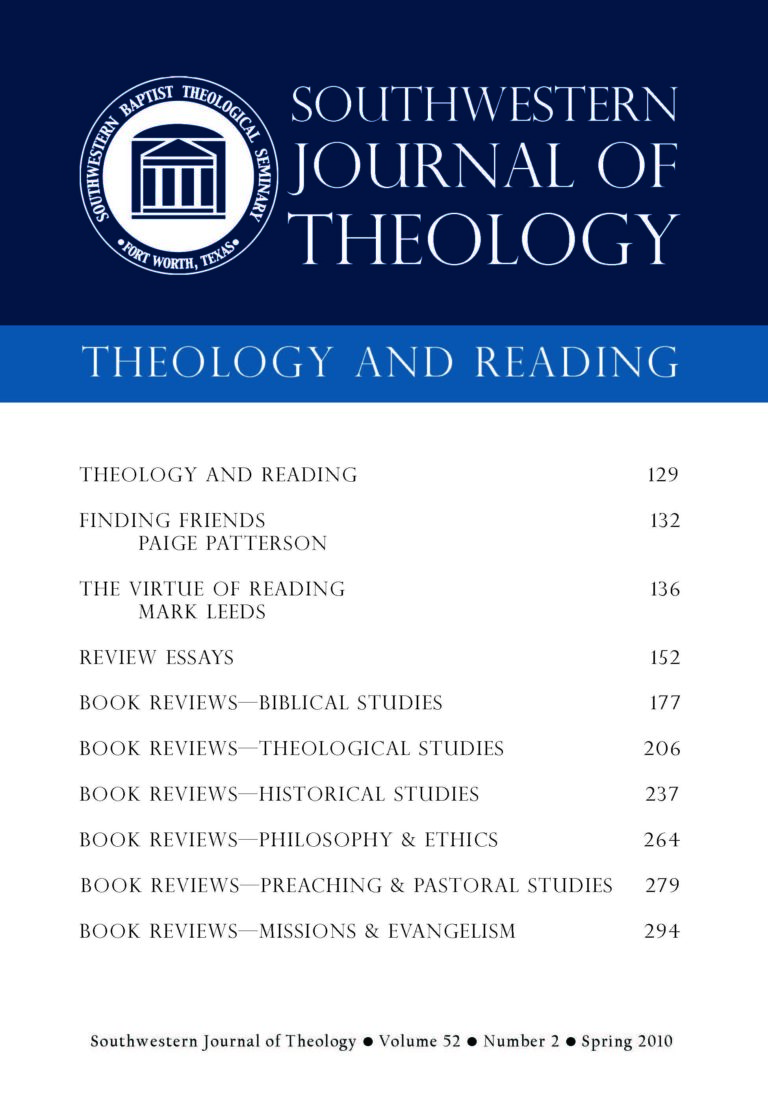
Theology and Reading
Southwestern Journal of Theology
Volume 52, No. 2 – Spring 2010
Managing Editor: Malcolm B. Yarnell III
By Stephen R. Haynes. Minneapolis: Fortress Press, 2006. 197 pages. Softcover, $22.00.
Hindsight is allegedly 20/20. However, that statement is ultimately suspect, especially when someone is proclaiming accolades or throwing aspersions on decisions made, proclamations uttered, and letters written sixty years after the event(s) in question. Stephen R. Haynes, however, appears to feel no compunction in looking backwards through the lenses of history and proclaiming that Dietrich Bonhoeffer failed, not only as a “Righteous Gentile” but also a Christian theologian.
In at least one aspect of Haynes’ argument, the evangelical reader can find common agreement—Bonhoeffer has been made a paragon Christian martyrdom even though it often requires suspending judgment regarding his more neoorthodox doctrinal tenets. However, that is not Haynes’ argument; his argument is that Bonhoeffer failed by not holding the dual covenantal approach to “Jewish salvation” of such theologians as Clark Williamson, Sidney G. Hall, and Franklin Littell (44–45, 110, 148). Therefore, according to Haynes, Bonhoeffer fails as a Christian theologian because he upholds the necessity of Jewish people coming to faith in Messiah Jesus (The Bethel Confession).
Haynes affirms the decision of Yad Vashem to deny Bonhoeffer the status of Righteous Gentile because the German Jewish individuals he helped to escape were converts to Christianity (15–18). It should be noted that the status of Righteous Gentile does not add to or detract from the reality of Bonhoeffer’s actions during the Third Reich. However, Haynes’ affirmation of this denial again illustrates his predisposition to negate Bonhoeffer’s efforts during the period because they do not match the religiously neutral, dialogue-driven approach of the twenty-first century Christianity. Haynes’ bias extends to his advocacy of certain resources and authors as definitive on the issue—including the always controversial Daniel Jonah Goldhagen of Hitler’s Willing Executioners (53, 59).
Haynes’ bias and skepticism ultimately cause this work to fail. A critical look should be taken at Bonhoeffer’s inter-relationship with the Jewish people during this period. He did not always hold to the highest of standards in his approach towards the Jewish people, especially in his fear of attending the funeral of his Jewish brother-in-law’s father in 1933 (113). He struggled in his terminology referring to the decision of the Jewish people (as a collective) to reject the Messiahship of Jesus (62–74). He was not as extreme as Martin Niemoller in his internal spiritual conflict (53, 63) but neither should he be tarred with the same brush, as Haynes attempts to do, as “Hitler’s theologian,” Gerhard Kittel (53, 63, 66).
An examination of The Bethel Confession that Bonhoeffer and other dissenters wrote in 1933 (74–80) in response to the rise of Adolf Hitler as Chancellor and ultimately Führer included a section on the Jewish question with the most profound of missional statements—“The confession affirms that the church is charged to call the Jews to repentance and to baptize the believers in the name of Christ for the forgiveness of sins. The refusal to evangelize the Jews ‘for cultural or political reasons’ is disobedience.” This is the Bonhoeffer that Haynes laments; however, it is this Bonhoeffer that evangelical Christians should praise.
Most Christians are introduced to Bonhoeffer through The Cost of Discipleship or via His Letters and Papers from Prison. These indeed are works of invaluable insight and theological depth. However, it is The Bethel Confession that should be placed on the bookshelf of every evangelical scholar.





